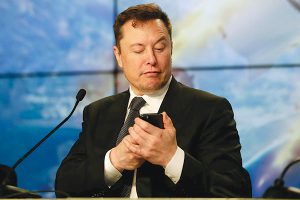There’s a lot of focus on Elon Musk’s Twitter Inc. purchase and plans to turn around the troubled social network. Most debates around the acquisition miss a crucial tenent of Musk’s glittering track record: He uses software to drive previously unimaginable advances in difficult problems, and then creates a virtuous spiral with investors and users. This approach is critical to understanding the future of technology and innovation in general, and Twitter in particular.
I make no prediction about how this will work with Twitter. On the one hand is Musk’s impressive record of success in businesses that were not thought to be amenable to radical software solutions. On the other hand is the difficulty of imagining the new and improved Twitter. There isn’t much insight to be gained from the immediate reactions of Twitter users and advertisers.
Two key points of general agreement though are that Twitter somehow created something of great social importance that is still poorly understood, and that the old Twitter management did a bad job of supporting that importance and monetizing it. Focusing on advertising revenue and worrying about scolds undercut the basic ethos of the platform to its valuable users. Old Twitter seems to have massively overspent on staffing for initiatives that did not appeal to users and were frequently abandoned when they did not produce quick profits.
Beyond this, there is little agreement. Few people have clear ideas of how Twitter can grow and generate profits. Musk’s first attempts at tinkering may or may not be helpful but they don’t point to the goal.
More insight can be gained by looking at Musk’s past rather than Twitter’s. People think of Musk as a hardware guy — cars and rockets — but he started in software with Zip2 and PayPal Holdings Inc. When he got into hardware, his innovations were to leverage software advances to speed development and cut capital costs.
In Musk’s texts to Twitter before the purchase, he emphasized his success in building “heavy-duty software systems,†presumably the rapid prototyping, production management and simulation tools so fundamental to the success of Tesla Inc. and SpaceX.
Musk appears to be thinking of Twitter as an engineering problem to be designed from the ground up, rather than as a social phenomenon to be monetized. That means understanding the fundamental value of Twitter and building infrastructure to support it, rather than making committee decisions to satisfy existing users, advertisers and third parties.
Another driver of Musk’s successes is his narratives. Musk tells stories that attract both talent and capital to make his dreams come true. This is trickier than it sounds. Talented people and investors are both skeptical and hear many stories.
Most visionaries have trouble attracting and managing the right talent and appealing to people betting their own money. Telling stories that appeal to the right creative people and investors, then managing the combination, is a rare skill.
—Bloomberg
 The Gulf Time Newspaper One of the finest business newspapers in the UAE brought to you by our professional writers and editors.
The Gulf Time Newspaper One of the finest business newspapers in the UAE brought to you by our professional writers and editors.
